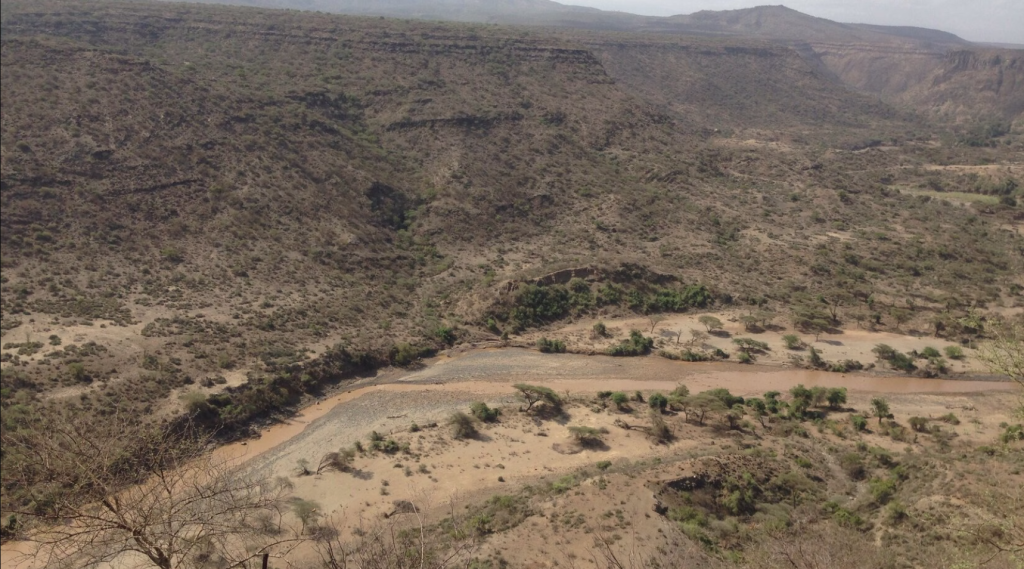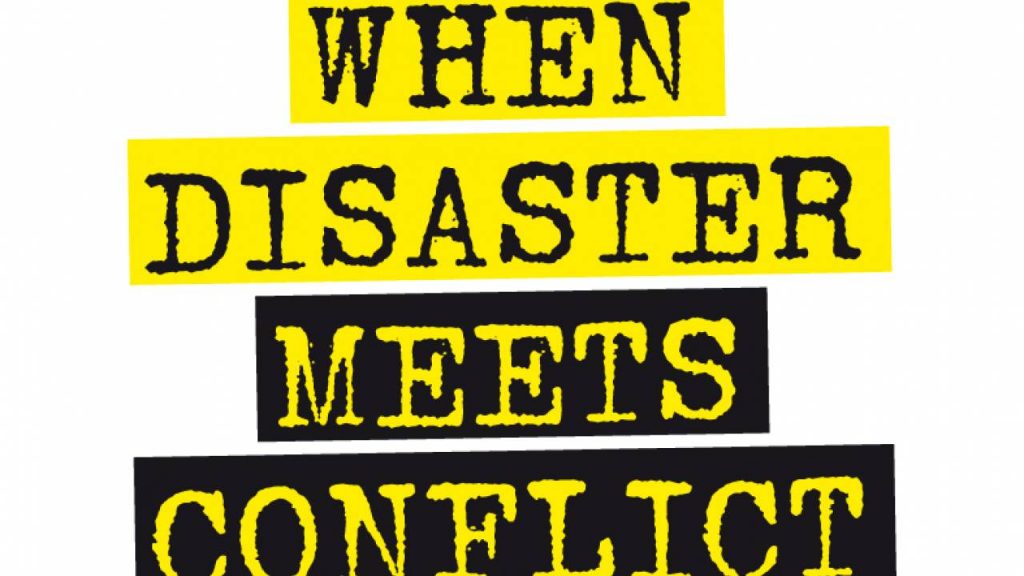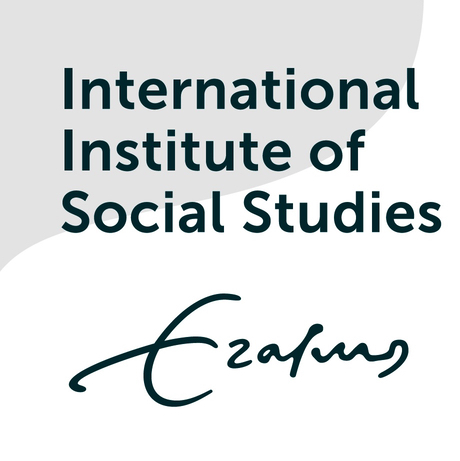
When disaster meets conflict
In research and policy, little attention has been paid to scenarios where disasters related to natural hazards happen in conflict situations, even though among the 400 disasters each year, more than 30% strike countries already affected by conflict.
There is evidence that conflict aggravates disaster and that disaster can intensify conflict – but not much is known about the precise relationship and how it may impact upon aid responses.
About the research
When Disaster Meets Conflict (Discord) studied the nexus between humanitarian aid and disaster governance.
It analysed how state, non-state and humanitarian actors respond to disasters in three conflict settings (high, low-medium, and post-conflict) in order to understand how the type of conflict impacts communities and the aid that the affected people are offered.
The project, which ran from 2015-2020, aimed to learn about the challenges, experiences and success factors for aid in each of the three settings. It also sought to understand how the politicization of disaster response affects the legitimacy, power and relations between governance actors. The research project comprises an international expert panel with 30 experts (half from the Global South) and 9 country case studies.
In addition to the core research, the project also conducted smaller case studies as well as intersectional research on areas where humanitarian governance overlaps with other domains, such as peace-keeping, gender and security, community resilience, development, and refugee care.
This research was conducted in Colombia, Bangladesh, Democratic Republic of Congo, France (Calais), Greece, Lebanon, Turkey, Curacao and Venezuela.

Societal relevance
The research team strives to ensure that the research they conduct is not only scientifically robust but also socially relevant and engaged. The team produced multiple research briefs, participated in many international consultancies and collaborations, events and conferences and wrote numerous opinion and blog pieces for a wider public.
Analyzing local responses to COVID-19
In the wake of the COVID-19 pandemic, researchers joined forces with MA students and PhD researches to investigate local mechanisms to cope with COVID-19 and its spill-over crises.
Main project findings
The main project findings have been summarized in four key research briefs.
The first brief provides an overview of general lessons learned on disaster governance in conflict settings and highlights the importance of a scenario-based approach.
The following conflict-specific briefs analyse the interaction of disaster and conflict through three case studies in each scenario:
- high-intensity conflict in South Sudan, Afghanistan and Yemen
- low-intensity conflict in Ethiopia, Myanmar and Zimbabwe
- post-conflict in Sierra Leone, Nepal and Haiti

Lessons on disaster governance & humanitarian action: A scenario-based approach

Understanding disaster reduction & response in high-intensity conflict settings

Politics of disaster response in authoritarian low-intensity conflict settings

Constructing disaster response governance in post-conflict settings
Outputs and findings
Take a look at our various project outputs for both academic and non-academic audiences.
Research briefs & case studies
General briefs
Throughout the project, the researchers have drawn several significant conclusions relevant for practitioners, policy makers and academics alike.
For an overview that highlights the importance of understanding how the type of conflict affects disaster response, and vice versa, check out these general briefs.
Expert panel
30 key humanitarian actors with vast experience in the field participated in an expert panel held in line with the so-called Delphi method. This method uses a cyclical research design with several rounds of questioning.
The goal was to establish an informed, evidence-based study about some of the most pressing challenges that are currently hampering the effectiveness of aid, as well as to collect observations of highly experienced practitioners on trends and recent experiences in the field.
In particular, emphasis was placed on ‘best practices’ and success factors for aid projects in different conflict settings, new actors and coalitions in the aid industry, and insights on the usefulness of new technologies and other promising dynamics. Work on the final round of this survey is ongoing.
High-intensity conflicts
Rodrigo Mena conducted research of high-intensity conflicts in South Sudan, Afghanistan and Yemen.
For an overview of the lessons learned regarding disaster response in high-intensity conflicts, check out this brief.
For a more detailed description of some of the case studies, read the individual country research briefs below:
Low-intensity conflicts
Isabelle Desportes conducted research of low-intensity conflicts in Ethiopia, Myanmar and Zimbabwe.
For an overview of the lessons learned regarding disaster response in low-intensity conflicts, check out this brief.
For a more detailed description of some of the case studies, read the individual country research briefs below:
Post-conflict
Samantha Melis conducted research of low-intensity conflicts in Sierra Leone, Nepal and Haiti.
For an overview of the lessons learned regarding disaster response in low-intensity conflicts, check out this brief.
For a more detailed description of some of the case studies, read the individual country research briefs below:
Mudslide response in Sierra Leone in 2017
Intersectionalities
In our research on intersectionalities in the governance of aid, we cover topics such as gender and security; community resilience; development; peace-building; and areas where disaster response meets refugee care.
Gender, sexuality and violence in humanitarian crises
This theme has gained importance in humanitarian policy and practice, and has become an increasingly important part of this project.
After more than four decades of discourses on ‘gender in development’ and a substantive history of evolving international law and practice on women, peace, and security, the humanitarian aid field recently started taking gender seriously. The focus in the sector on sexual violence has brought significant attention to some of the challenges that many women face, but has also reproduced a generalized image of women as victims.
‘Gender’ often continues to mean a singular concern for women, neglecting questions of agency and the dynamic and changing realities of gendered power relations. Research under this heading has mainly focused on the Democratic Republic of Congo. This initially concerned the responses to sexual violence. It then shifted to attention for transactional sex in crisis situations.
Publications
Blog post: Emergency sex work: should NGOs recognize transactional sex as livelihood strategy?
Special issue Journal of Disasters Gender, sexuality and violence in humanitarian crisis
Hilhorst, D, N. Douma (2017) ‘Beyond the hype? Responses to sexual violence in DRC in 2011 and 2014’ in: Hilhorst D, H. Porter and R. Gordon (eds) special issue on Gender, sexuality and violence in humanitarian crises, Disasters 41(S1) pp 79-98
Mwapu, I, D. Hilhorst et al. Women engaging in transactional sex and working in prostitution: Practices and underlying factors of the sex trade in South Kivu, the Democratic Republic of Congo
Formson, C. and D. Hilhorst (2016) The many faces of transactional sex: Women’s agency, livelihoods and risk factors in humanitarian contexts: A Literature Review. SLRC working paper, 20pp.
Blog post: Challenging humanitarianism beyond gender as women and women as victims
Refugee care in a champion country for DRR: Rohingya in Bangladesh
By Dorothea Hilhorst, Rakib Ahmed and Rodrigo Mena, fieldwork in 2019.
In 2017, Bangladesh saw the influx of more than 700,000 Rohingya seeking refuge from extreme violence in Myanmar. This refugee crisis comes to a country that is very vulnerable to disaster and has been a forerunner in the field of Disaster Risk Reduction.
- How did the track record in DRR help Bangladesh in organizing the care for the refugees around Cox Bazaar?
- How has the governance and response evolved?
The results of this research were presented by Rakib Ahmed at the international conference on ‘Rohingya Crisis in Bangladesh: Challenges and Sustainable Solutions’ organised by North South University July 2019.
Curacao and forced displacement from Venezuela
By Dorothea Hilhorst, Peter Heintze and Dennis Dijkzeul, fieldwork 2018.
The economy of the small island state of Curacao has always been strongly interwoven with Venezuela, where many people from Curacao went for work, residence, study or medical care.
Today, with the crisis in Venezuela, the table seems to have turned and thousands of Venezuelan migrants seek protection on Curacao.
- What is the impact of this crisis on the small community of Curacao?
- And what is the role of the Netherlands, since Curacao is part of the Kingdom of the Netherlands? The Netherlands always favours the policy to settle refugees in the region of displacement, but now this country is the region and yet seems little engaged in the care for Venezuelans.
Forced migration from Europe’s borderlands
This theme concerns the intersection of humanitarian aid and forced migration in Europe. While refugees in Europe have been analysed from many angles, this research focuses on how the humanitarian agencies deal with the challenges of refugee care on a continent that has ample resources to help but frames refugees increasingly as unwanted strangers.
Case studies
Refugee care on Lesbos, Calais and Libya
By Dorothea Hilhorst, Maria Kagan and Olivia Quinn, fieldwork 2016 and 2018. Research presented at the 4th International Humanitarian Studies Association held in the Hague, August 2018.
Interface between volunteer and professional humanitarians in Lesbos
By Roanne van Voorst, fieldwork 2016. Paper under review in VOLUNTAS.
Accountability in humanitarian aid
This theme concerns the changing accountability relations in the humanitarian sector, especially with regards to accountability towards affected populations. The theme gained even more prominence with the scandal about sexual abuse in the sector in 2018.
Case studies and publications
- Hilhorst, D (2015) ‘Taking accountability to the next level’, in Humanitarian Accountability Report 2015, pp 104-112, Geneva, Core Humanitarian Standard Alliance
- In the summer of 2018, the Ministry of Foreign Affairs in the Netherlands commissioned a scoping study on an ombuds in humanitarian aid. By Dorothea Hilhorst, Asmita Naik and Andrew Cunningham.
- International Ombuds for Humanitarian and Development Aid. Scoping Study. International Institute of Social Studies, pp. 55, –
- Changing accountability practices in Afghanistan, Sierra Leone and Myanmar. By Dorothea Hilhorst, Roanne van Voorst, Rodrigo Mena and Samantha Melis. Fieldwork in 2018, ongoing.
Podcast
Taking Humanitarian Accountability to the Next Level Podcast by Dorothea Hilhorst.
Resilience and citizenship
There is a trend in disaster studies, and other domains of development, whereby the notion of vulnerability gives way to the idea of resilience.
However, leading disaster scholars argue that this is much more than a conceptual change. It leads away from questions of ‘why are people vulnerable and who is responsible’ to relying on communities’ capacities to survive and adapt without considering structural change.
The researchers engaged with this topic through organizing a workshop hosted at the International Institute of Social Studies, and a panel (2016 DSA Conference at the University of Oxford) discussing the role of ‘citizenship’ in disaster- and conflict-affected settings.
Publications
Humanitarian governance and resilience building: Ethiopia in comparative perspective, in 2019 by Dorothea Hilhorst, Isabelle Desportes and Cecile de Milliano in Disasters.
Classical humanitarianism and resilience humanitarianism: making sense of two brands of humanitarian action, in 2018 by Dorothea Hilhorst in the Journal for International Humanitarian Action
Humanitarian access in high-intensity conflict settings
Humanitarian access becomes an increasingly contested issue in situations of violent conflict. In settings like Syria, Yemen or South Sudan, humanitarian aid deals with a multitude of actors who are often suspicious or even hostile towards humanitarian relief efforts.
At the same time, humanitarian access agreements are often the only feasible point on which conflict parties can agree, at least temporarily, which makes humanitarian access negotiations highly relevant also beyond the sphere of humanitarian actors.
In cooperation with Jan Pospisil of the Austrian Study Centre for Peace and Conflict Resolution.
The researchers engaged with this topic through developing a research project on humanitarian access and peace interventions in Syria (interviews and analyses were conducted in 2018/2019) and through establishing a working group of experts on this topic.
Publications
Key publications
These are the most important publications published by year by our research team. The complete list of publications from our researchers can be found on their profile pages.
Melis, S. (Samantha), & Hilhorst, D.J.M. (2020). When the mountain broke: disaster governance in Sierra Leone. Disaster Prevention and Management: An International Journal. doi:10.1108/DPM-03-2020-0076.
Mena, R. (Rodrigo), & Hilhorst, D.J.M. (2020). The (im)possibilities of disaster risk reduction in the context of high-intensity conflict: the case of Afghanistan. Environmental Hazards.
E.H.C. Kuipers, I. Desportes & M.A. Hordijk (2019). Of locals and insiders – a ‘localized’ humanitarian response to the 2017 Mocoa mudslide in Colombia? Disaster Prevention and Management. doi: 10.1108/DPM-12-2018-0384
Desportes, I., Mandefro, H., & Hilhorst, D.J.M. (2019). The Humanitarian theatre: Drought response during Ethiopia’s low-intensity conflict of 2016. Journal of Modern African Studies, 57(1), 1–29.
Brauch, H.G., Oswald Spring, U., Collins, A., Serrano Oswald, S.E. (Eds.) (2019) Change, Disasters, Sustainability Transition and Peace in the Anthropocene. Springer
van Voorst, R. (2019). Praxis and paradigms of local and expatriate workers in ‘Aidland’. Third World Quarterly
Desportes, I. (2019). Getting relief to marginalised minorities: the response to cyclone Komen in 2015 in Myanmar. Journal of International Humanitarian Action, 1–26.
Hilhorst, D.J.M. (2018). Classical humanitarianism and resilience humanitarianism: making sense of two brands of humanitarian action. Journal of International Humanitarian Action, 3, 1-12.
van Voorst, R.S. & Hilhorst, D.J.M (2017). Humanitarian action in disaster and conflict settings. Insights of an expert panel.
Other publications
2019
Desportes, I., Mandefro, H., & Hilhorst, D.J.M. (2019). The Humanitarian theatre: Drought response during Ethiopia’s low-intensity conflict of 2016. Journal of Modern African Studies, 57 (1), 1–29.
Desportes, I. (2019). Getting relief to marginalised minorities: the response to cyclone Komen in 2015 in Myanmar. Journal of International Humanitarian Action, 1–26.
Hilhorst, D.J.M., Desportes, I., & de Miliano, C (2019). Humanitarian governance and resilience building: Ethiopia in comparative perspective. Disasters, 43(S2), 109-131.
Melis, S. (2019). ‘Questioning ‘the local’ in ‘localisation’: A multi-local reply.’ blISS. The ISS Blog on Global Development and Social Justice. Available: 18 Feb 2019
van Voorst, R.S. (Forthcoming in 2019). Juxtapositions and disasters in Jakarta. Urban Forum.
Van Voorst, R.S. (2019). PDNA Guidance: Integrating Conflict Sensitivity. UNDP Peer review assessment & input.
2018
Fuller, A., Hellman, J., Kusno, A., Thynell, M. & van Voorst, R.S.(2018). Jakarta: a Conversation. In Jakarta Claiming spaces and rights in the city. London: Routledge
Hellman, J. & van Voorst, R.S.(2018). Claiming Space in Jakarta: Megaprojects, City Planning and Incrementalism. In J Hellman, M Thynell & R van Voorst (Eds.), Jakarta. Claiming spaces and rights in the city (pp. 157-172). London: Routledge
Hellman, J., Thynell, M. & Van Voorst, R.S.(2018). Introduction: Shaping Jakarta, Jörgen Hellman, Marie Thynell, Roanne van Voorst. In J Hellman, M Thynell & R.S. van Voorst (Eds.), Jakarta. Claiming spaces and rights in the city (pp. 1-14). London: Routledge
Hilhorst, D.J.M. (2018). Classical humanitarianism and resilience humanitarianism: making sense of two brands of humanitarian action. Journal of International Humanitarian Action, 3, 1-12. doi: 10.1186/s41018-018-0043-6
Kuipers E. H. C. (2018). Missed opportunity foretold. Exploring the Co-Governance of Humanitarian Aid in Conflict-Affected Colombia: Case Study of the Mocoa Mudslide 2017. Unpublished Masters thesis, University of Amsterdam.
Melis, S. (2018). The Fragile State of Disaster Response: Understanding Aid-State-Society Relations in Post-Conflict Settings. In Climate Change, Disasters, Sustainability Transition and Peace in the Anthropocene (Vol. 25). Springer
Mena Fluhmann, R.A. (2018). Responding to Socio-environmental Disasters in High-Intensity Conflict Scenarios: Challenges and Legitimation Strategie. In HG Brauch, U Oswald Spring, A Collins & SE Serrano Oswald (Eds.), Climate Change, Disasters, Sustainability Transition and Peace in the Anthropocene (The Anthropocene: Politik, Economics, Society, Science) (pp. 27-66). Switzerland: Springer
Srikandini, A.G. (2018, March 27). Politics of Disaster Risk Governance in Indonesia and Myanmar: a study into the dynamics of governance network on Disaster Risk Reduction (DRR). Dissertation, EUR Supervisor(s): prof.dr.ir. D.J.M. Hilhorst & R.S. van Voorst.
Srikandini, A.G, Hilhorst, D.J.M. & van Voorst, R.S. (2018). Disaster Risk Governance in Indonesia and Myanmar: The Practice of Co-Governance. Politics and Governance, 6 (3), 180-189. doi: 10.17645/pag.v6i3.1598 Opens external [go to publisher’s site]
Srikandini, A.G., Van Voorst, R.S. & Hilhorst, D.J.M. (2018). Disaster Risk Governance in Indonesia and Myanmar: The Practice of Co-Governance. Politics and Governance, 6 (3), 180-189.
van Voorst, R.S. & Hilhorst, D.J.M. (2018). Key Points of Interactive Research: An Ethnographic Approach to Risk. In A. Olofsson & J.O. Zinn (Eds.), Researching Risk and Uncertainty. Methodologies, Methods and Research Strategies (Critical Studies in Risk and Uncertainty) (pp. 53-76). Cham: Palgrave Macmillan
van Voorst, R.S., Hellman, J. & Thynell, M. (2018) Shaping Jakarta: Claiming spaces and rights in the city. [Edited Volume]. Oxfordshire: Routledge.
van Voorst, R.S. & Desportes, I. (2018). (How) should scholars say what humanitarians can’t?(blog). blISS – The ISS Blog on Global Development and Social Justice. (available: 16 May 2018).
2017
Carcamo, F. & Mena Fluhmann, R.A. (2017). Conflictos socio-ambientales en la sociedad moderna: aportes de la ecología política Latinoamericana y la teoría de la acción comunicativa. Journal of Political Ecology, 24, 1077-1093.
Hilhorst, D.J.M., Porter, H.E. & Gordon, R. (2017). Gender, sexuality and violence in humanitarian crises. Disasters, 41, 3-16. doi: 10.1111/disa.12276
van der Haar, L. K.C.G. & Hilhorst, D.J.M. (2017). Changing Gender Role: Women’s Livelihoods, Conflict and Post-conflict Security in Nepal. Journal of Asian Security and International Affairs, 4 (2), 175-195. doi: 10.1177/2347797017710743
Mena Fluhmann, R.A., Hilhorst, D.J.M., & Melis, S. (2017) Conflicts and disasters: an integrated debate for peacebuilding and Development. IPRA Newsletter (International Peace Association). Vol. 6 No. 4 (November 2017)
Stepputat, F. & van Voorst, R.S. (2017). Urban Governance and Sustainable Development. (External report, Cities on the Agenda, no 4). Copenhagen: Danish Institute for International Studies (DIIS)
Van Voorst, R.S.(2017). Localization – according to whom? (blog). BLISS -blog on Global Development and Social Justice. (available: 23 Nov 2017).
2016
Desportes I. & D.R. Colenbrander (2016). Navigating interests, navigating knowledge: towards an inclusive set-back delineation along Cape Town’s coastline. Habitat International, 54 (2), 124-135. doi: 10.1016/j.habitatint.2015.12.016
Arensman, B., Wessel, M.G.J. van & Hilhorst, D.J.M. (2016). Does local ownership bring about effectiveness? The case of a transnational advocacy network. Third World Quarterly. doi: 10.1080/01436597.2016.1257908
Hilhorst, D.J.M, Hodgson, L., Jansen, B. & Mena Fluhmann, R.A. (2016). Security guidelines for field research in complex, remote and hazardous places. Opens external The Hague: ISS-EUR
van Voorst, R.S. & Hellman, J. (2016). One Risk Replaces Another. Floods, Evictions and Policies on Jakarta’s Riverbanks. Asian Journal of Social Science, 43 (6), 786-810.
van Voorst, R.S. (2016). Natural Hazards, Risk and Vulnerability. Floods and Slum Life in Indonesia. (Routledge Humanitarian Studies). Oxon, UK: Routledge
van Voorst, R.S. (2016) Natural Hazards, Risk and Vulnerability. Floods and Slum life in Indonesia. [book]. Oxfordshire: Routledge
2015
Desportes, I., Waddel, J. & Hordijk, M.A. (2015) Improving flood risk governance through multi-stakeholder collaboration: a case study of Sweet Home informal settlement, Cape Town. South African Journal of Science. doi: 10.1080/03736245.2015.1052842
Hilhorst, D., Baart, J., van der Haar, G.,Leeftink, F. (2015) Is Disaster ‘normal’ for indigenous people? Indigenous knowledge and coping practices”, Disaster Prevention and Management, Vol.24:4, 506-522
van Voorst, R.S. (2015). Formal and informal flood governance in Jakarta, Indonesia. Habitat International, August (23). doi: 10.10.1016/j.habitatint.2015.08.023
van Voorst, R.S. (2015). Heterogeneous risk-handling styles in Jakarta, Indonesia. Disaster Prevention and Management, 24 (4).
van Voorst, R.S. & Padawangi, R. (2015) Floods and Forced Evictions in Jakarta. People, politics and planning collide in riverside slum Kampung Pulo. Online article, New Mandala. URL:
van Voorst, R.S.& Stepputat, F. (2015) Research Report ‘Natural hazard, urban governance, aid and development cooperation in the Global South’. Copenhagen: Danish Institute for International Studies & Danish Ministry of Foreign Affairs.
van Voorst, R.S., Wisner, B., Hellman, J. & Nooteboom, G. (2015). Introduction to the ‘risky everyday’ (editorial). Disaster Prevention and Management, 24 (4). doi: 10.1108/DPM-04-2015-0077
Online course and training
MOOC: Disaster Risk Reduction and humanitarian aid in conflict settings
The research team has also developed a Massive Open Online Course (MOOC) on Disaster Risk Reduction and humanitarian aid in conflict settings
The MOOC is meant primarily for practitioners, but also open to students or otherwise interested people.
This MOOC teaches you to develop accountable, high-quality and ethical responses to disaster in conflict-affected areas. It stimulates participants to think about humanitarian aid, DRR and disaster response in contexts where conflict is ongoing, lingering, or has characterized the setting in recent times, as well as about the hard choices and dilemmas faced by humanitarian actors in conflict settings.
Moreover, you will learn to distinguish the different challenges and effective, positive examples of aid in three types of conflict settings.
Through videos, interviews, guest lectures and realistic case-studio, learning becomes both relevant and fun; everything you learn will be applicable for practice in the field.
More information and registration
Interested in this MOOC? Full details and free enrolment are available on Coursera.
Security guidelines manual
In collaboration with Lucy Hodgson and Bram Jansen, Dorothea Hilhorst and Rodrigo Mena developed a manual to assist researchers to conduct their field-based research or fieldwork in hazardous, remote or complex environments as safely and securely as possible.
Contents
Section 1 – deals with the particular security considerations posed by field-based research and suggests a set of ethical guidelines for field-based research
Section 2 – is about fieldwork and details how to conduct context analysis and risk assessment as well as how to plan and stay healthy during the course of field research
Section 3 – is largely comprised of checklists and key considerations to assist researchers in managing their own personal security, both in terms of preventive and reactive measures
The Manual is available for download in:
Training events
In addition to releasing the manual, the researchers have teamed up with ISS and the Erasmus University of Rotterdam to raise awareness of individuals about safety in the field, as well as to develop institutional measures which can and should be taken to increase the safety of researchers during the fieldwork. Both the manual and the training events were created in order to address universities lagging behind in creating a security system for researchers including a policy, training, and insurance.
This blog post by Dorothea Hilhorst looks into the difficulties associated with ensuring the right for researchers to conduct their research safely – ‘A Double Message about Safety and Security for Field Research: “Protection Is Crucial” and “Don’t Overdo It”’.
Blogs and op-eds
Blogs and newspapers are a good way to let academic voices be heard outside of academic journals and conferences, and to touch on highly policy- and societally-relevant topics such as localization which is high on the UN agenda, or the self-censoring which aid actors face in authoritarian and/or conflict settings. They also enable us to take part in more broader societal debates less directly related to our project topic, but which may be related and in any case very much matter to us, for instance why flying should be considered as the ‘new smoking’ in aid but also academic circles.
We have produced more than hundred communications of our findings and insights in many public events, TV, radio, Op-ed and blogs. We often publish through the ISS Blog on Global Development and Social Justice, and Thea Hilhorst has a two-weekly blog at Radio Sublime (in Dutch).
BlISS blog posts
Samantha Melis on BlISS: Questioning the ‘local’ in ‘localisation’: A multi-local reply
Rodrigo Mena on BlISS: Are you oversimplifying? Research dilemmas, honesty and epistemological reductionism
Dorothea Hilhorst on BlISS: The battle for Zwarte Piet: Everyday racism in the Netherlands
Dorothea Hilhorst on BlISS: It’s time for flying to become the new smoking
Dorothea Hilhorst on BlISS: (Re-)Shaping Boundaries in Crisis and Crisis Response: introducing the 2018 International Humanitarian Studies Association Conference
Rodrigo Mena on BlISS: Technological solutions for socio-political problems: revisiting an open humanitarian debate
Roanne van Voorst and Isabelle Desportes on BlISS: (How) should scholars say what humanitarians can’t?
Dorothea Hilhorst on BlISS: Aid agencies can’t police themselves. It’s time for a change.
Dorothea Hilhorst and Adriaan Ferf on BlISS: How to make sure that research has a durable impact, examples from DRC
Rodrigo Mena and Kees Biekart on BlISS: Scholars at Risk: precarity in the Academe and Possible Solutions
Roanne van Voorst on BlISS: Localization according to whom?
Op-eds and media appearances
2019
Thea Hilhorst on Sublime about the relationship between the Netherlands duty to Venezuelan refugees in Curacao (in Dutch)
2018
Thea Hilhorst on NOS Nieuwsuur about the crisis in Yemen
Thea Hilhorst on Radio 1 about sexual abuse by NGO’s and aid workers
Thea Hilhorst on Radio 1 about the earthquake in Sulawesi, Indonesia
Thea Hilhorst elaborates on the implications for effective diplomacy in situations of crisis, that can be found in the book ‘Famine in Somalia: Competing Imperatives, Collective Failures’ by Maxwell and Majid
2017
Thea Hilhorst Guerrilla-lecture for the Universiteit van Nederland (Dutch) – When do you ever see a professor teaching in a toga on the streets? Thea Hilhorst talks to people in the streets about the famine in South Sudan, Nigeria, Somalia and Yemen, to give them an answer to two important questions: Why is there famine & does aid help?
Thea Hilhorst column entitled ‘Why does aid work’ on the Wereld Draait Door website
Thea Hilhorst on BNR radio about hurricane Irma on Sint Maarten
Thea Hilhorst op-ed ‘Sometimes you have to work together with a corrupt government in order to deliver emergency aid’ in newspaper Trouw
2016
Thea Hilhorst on HUMAN in response to the documentary ‘The Crisis Caravan’ (Dutch) – Emergency aid started with the idea that it’s temporary, this is how the system is set up. It created friction as in reality aid often requires long-term planning.
The team
Prof. Dr Thea Hilhorst; Dr Roanne Van Voorst; Dr Rodrigo Mena; Dr Isabelle Desportes; Dr Samantha Melis
Contact the research team at humanitarianstudiescentre@iss.nl

When Disaster Meets Conflict was funded as part of the Innovational Research Incentives Scheme (Vici) scheme (project no. 453/14/013), financed by the NWO, the Dutch Research Council. NWO facilitates excellent, curiosity-driven disciplinary, interdisciplinary and multidisciplinary research.
Talent Programme Vici
Talent Programme Vici is one of the largest grants for individuals in the Netherlands and targets outstanding senior/advanced researchers. The funding enables the talented scientists to set up their own innovative line of research and put together their own research group.
Contact
humanitarianstudiescentre@iss.nl
Visit the HSC
Based at the International Institute of Social Studies
Kortenaerkade 12
2518 AX The Hague
The Netherlands
Quick links
blank>




